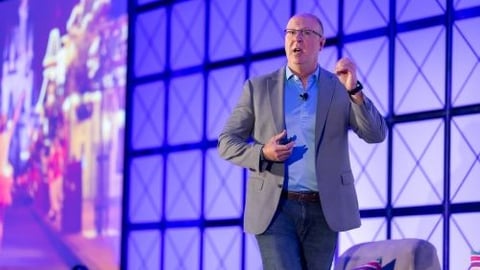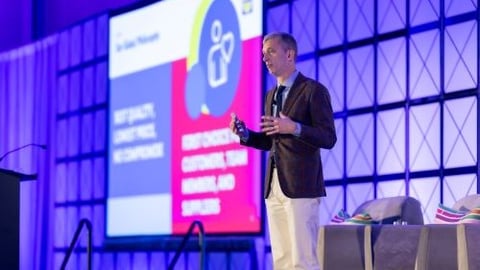Kroger, Giant Co. and ADUSA Leaders Share How to Unlock Your Career Potential
Three female leaders shared the Grocery Impact stage last week in Orlando, Fla., for a special workshop to share the key elements women in the retail industry should consider when carving out their path to success. The Women’s Leadership Workshop, moderated by Progressive Grocer Multimedia Editor Emily Crowe, featured Senchal Murphy, senior director of human resources at The Kroger Co.; Jennifer Scott, VP of human resources for The Giant Co.; and Nancy Huynh, VP, finance at ADUSA Distribution & Transportation.
One of the themes of the discussion was the importance of taking on stretch opportunities, which are projects or tasks that are outside of your current skill level and that can help you learn and grow professionally.
Murphy pointed out that stretch opportunities can excel your own capabilities. “Be open to a shift, because that experience could truly unlock the full potential of your career,” she said.
Scott reassured attendees that it's okay to be uncomfortable when taking on a stretch assignment and not knowing everything about the project. She explained that she’s worked with Huynh on a supply chain project, admitting that initially, she didn’t know anything about supply chain. However, it was stretch projects like these that led Scott to her current leadership role at Giant.
Huynh chimed in with her thoughts on how learning on the job plays into career development. “Knowing what you don't know is probably the most important part,” she said. “You have to know that you probably don't know enough about conveyor systems or engineering or human resources, for example, so you need to be able to surround yourself with people that can help you. I think the saying is always look for the helpers, and I'm always looking for the helpers.”
"It's important to holistically understand all the areas of the organization and how they contribute to the overall business," added Scott.
When Murphy thinks about holistic development, mentorship is definitely part of that. “We can learn so much from each other,” she said. “I know that I learned so much from my peer group. Whether it's informal or formal mentorship, we need to establish those types of relationships to help us grow and develop. But when you have a mentor, really be clear about what you're seeking to gain from that experience and that relationship, and invest in it.”
Murphy also emphasized making the mentorship worthwhile, “because when people take time to spend with us, that means a lot. So make sure that it’s contributing to your overall development and performance output.”
Being able to successfully work cross-functionally within an organization is another important aspect to unlocking career success. Huynh advised attendees to approach a cross-functional working space with a level of empathy and understanding, and to leave room for discussion. “Those discussions don't have to be rosy and rainbows and butterflies, right?” she pointed out. “They're likely to have friction. Friction is not a bad thing. Respectful friction will bring better business decisions, but you have to come to it in a mindset that says, ‘Hey, let me come in and listen to the people that I'm working with. Let me understand where their pain points are and how do we solve the problem together.'”
[RELATED: Why Meijer’s CEO Keeps a Relentless Focus on His Customers]
Murphy delved into the fundamental idea that unlocking an amazing career means being invested in the role you currently have. “It's really important we fundamentally bloom where we're planted,” she said. “And all that means is we're invested in the role we have today and being exceptional with the contributions we provide to our organization, our teams and our customers. Sometimes when we're looking at that amazing career we will have, we lose sight of what's right in front of us, and right in front of us is a lot of contribution and value to the company."
Added Huynh: “You need to do the job you have today exceptionally well. And that is the ticket of entry through the door.”
“I fundamentally believe when you focus on the job that you're in and the value that you add and the teams that you lead, your career unlocks on its own,” said Murphy. “Things sometimes don't happen as fast as you might want it, but in hindsight, that experience is so valuable. … Really think about the sky's the limit, but be present in the role that you have today, because that will really unlock the next role that you have and those beyond that.”
Once you have unlocked that ideal leadership position, Huynh shared that “being nice” doesn’t necessarily mean being a good leader. “I think being kind is being a good leader, because clarity is kindness,” she clarified. “If you are not clear on the expectations that you have set, if you are not clear on what you are observing, you are not giving that kindness to your team on how they have the potential to grow. And that's a big hurdle you have to overcome as the leaders when you develop people; no one wants to tell people that they did something wrong. No one actually likes giving constructive feedback, but you have to do it if you're going to give someone the chance to be better. That's something you just have to be really aware of, and it's responsibility as a leader, but it's also a privilege. You have the privilege of teaching people. So take that seriously.”
“And own your leadership style,” reminded Scott. “It helps keeps you authentic when you are having those conversations with team members.”






